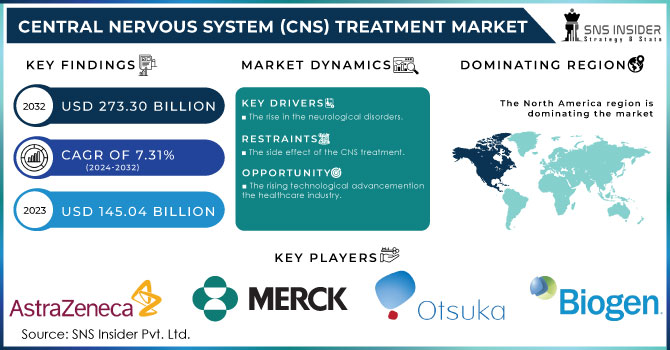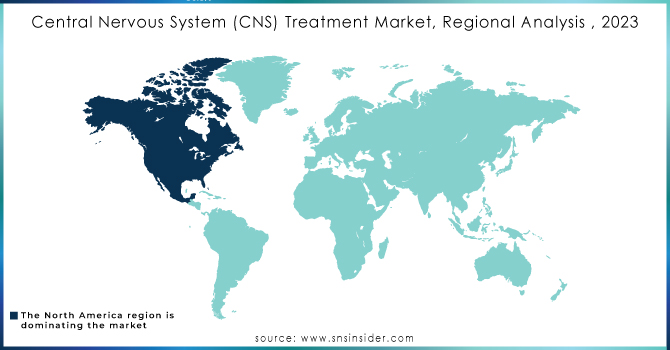Central Nervous System Treatment Market Size:
The Central Nervous System (CNS) Treatment Market size was valued at USD 145.04 Bn in 2023 and is expected to reach USD 273.30 Bn by 2032 and grow at a CAGR of 7.31% over the forecast period of 2024-2032. The individual illness or disease being treated determines the course of treatment for central nervous system (CNS) diseases. The CNS can be impacted by a wide range of conditions, including neurological conditions like epilepsy and multiple sclerosis as well as neurodegenerative diseases like Alzheimer's disease and Parkinson's disease. Here are a few typical CNS problem therapy modalities. Pharmacological therapies are frequently utilised to treat CNS diseases. Depending on the particular disease and symptoms involved, these drugs may change. Analgesics for pain relief, anticonvulsants for epilepsy, dopaminergic medicines for Parkinson's disease, and immunomodulatory medications for multiple sclerosis are a few examples of what they might be. It is crucial to highlight that depending on the exact CNS condition and the person's personal circumstances, the specific treatment options and technique can differ greatly. Therefore, in order to select the most suitable treatment plan, it is essential to contact with healthcare experts who specialise in the particular illness.

To Get More Information on Central Nervous System (CNS) Treatment Market - Request Sample Report
Market Dynamics:
Drivers: The rise in the neurological disorders.
The underlying cause of disorders like Alzheimer's disease or Parkinson's disease may be an aberrant protein buildup (beta-amyloid plaques in Alzheimer's) or a failure of a particular neurotransmitter (dopamine depletion in Parkinson's disease). Different underlying causes may be present in conditions like epilepsy or multiple sclerosis. In multiple sclerosis, an inflammatory reaction causes inflammation and myelin sheath destruction, whereas aberrant brain electrical activity may be the driving force behind epilepsy.
Restrain: The side effect of the CNS treatment.
Drugs that target the CNS frequently have serious adverse effects. It's critical to strike a balance between therapeutic effectiveness and tolerability. The overall quality of life for those getting therapy may be impacted by certain treatment’s unfavourable effects on cognition, emotions, or physical functioning.
Opportunity: The rising technological advancement ion the healthcare industry.
Precision medicine has become possible in the treatment of CNS diseases thanks to developments in genomics and molecular profiling. Understanding a person's particular genetic make-up and molecular traits paves the way for the development of personalised treatment plans that result in more focused and efficient therapy.
Challenge:
Lack of awareness and access issues in the undeveloped regions.
There may be differences in the treatment options and outcomes for people with CNS illnesses due to access to specialised care, cutting-edge therapies, and healthcare resources. To guarantee that all patients have fair access to care, these gaps must be addressed.
Impact of Recession:
Due to budgetary limitations, people and governments may cut back on healthcare spending during a recession. This may make it difficult to obtain and pay for the necessary treatments for CNS illnesses. Patients could have trouble getting prescription drugs, getting specialised treatment, or getting access to rehabilitation services.
Current clinical studies for CNS medicines may be impacted by economic difficulties connected to the recession. Financial limitations may force pharmaceutical corporations and research organisations to postpone or discontinue clinical trials. This may cause a delay in the delivery of treatments that might be helpful to patients.
Impact of Russia-Ukraine War
Medication, medical equipment, and other supplies used in CNS treatment may experience delays or shortages if the conflict affects supply chains or trade routes. This can have an effect on the accessibility and availability of CNS therapy choices in the impacted areas.
The conflict between Russia and Ukraine has the potential to affect regional economies as well as international markets. The CNS market may be impacted by economic instabilities and changes that have an impact on investment, research funding, and overall healthcare spending.
Key Market Segmentation
By Disease
-
Neurovascular disease
-
CNS Trauma
-
Infectious Disease
-
CNS Cancer
-
Others
By Drug Class
-
Interferons
-
Dopamine Agonists
-
Others
By Distribution Channel
-
Hospital Pharmacies
-
Retail Pharmacies
-
Online Pharmacies
Regional Analysis:
The North America region will be dominating the market because of the rising technological advancement in the developed countries of this region, Both the US and Canada have well-established healthcare systems with cutting-edge medical technology and a large choice of CNS problem treatment options. These nations have strong capacities for research and development, which helps to advance CNS medicines. Although it might vary depending on factors like insurance coverage and geography, access to specialised care, clinical trials, and novel therapies is generally high. Different healthcare systems exist in European nations, therefore access to CNS treatment and treatment recommendations vary. In general, nations with well-resourced healthcare systems, like Germany, France, and the United Kingdom, provide extensive and cutting-edge CNS therapies. Depending on their healthcare systems and resources, Eastern European countries may have varied degrees of access to advanced medical care.

Do You Need any Customization Research on Central Nervous System (CNS) Treatment Market - Enquire Now
Key Players
The major players are Biogen, Otsuka Pharmaceutical, Eli Lilly and Company, Merck & Co, Astra Zeneca, Johnson & Johnson, Pfizer, Novartis AG, Teva Pharmaceutical Industries Ltd, Shire Plc. and others.
| Report Attributes | Details |
| Market Size in 2023 | US$ 145.04 Bn |
| Market Size by 2032 | US$ 273.30 Bn |
| CAGR | CAGR of 7.31% From 2024 to 2032 |
| Base Year | 2023 |
| Forecast Period | 2024-2032 |
| Historical Data | 2020-2022 |
| Report Scope & Coverage | Market Size, Segments Analysis, Competitive Landscape, Regional Analysis, DROC & SWOT Analysis, Forecast Outlook |
| Key Segments | • By Disease (Neurovascular disease, CNS Trauma, Mental Health, Infectious Disease, CNS Cancer, Others) • By Drug Class (Interferons, Analgesics, Dopamine Agonists, Others) • By Distribution Channel (Hospital Pharmacies, Retail Pharmacies, Online Pharmacies) |
| Regional Analysis/Coverage | North America (US, Canada, Mexico), Europe (Eastern Europe [Poland, Romania, Hungary, Turkey, Rest of Eastern Europe] Western Europe] Germany, France, UK, Italy, Spain, Netherlands, Switzerland, Austria, Rest of Western Europe]). Asia Pacific (China, India, Japan, South Korea, Vietnam, Singapore, Australia, Rest of Asia Pacific), Middle East & Africa (Middle East [UAE, Egypt, Saudi Arabia, Qatar, Rest of Middle East], Africa [Nigeria, South Africa, Rest of Africa], Latin America (Brazil, Argentina, Colombia Rest of Latin America) |
| Company Profiles | Biogen, Otsuka Pharmaceutical, Eli Lilly and Company, Merck & Co, Astra Zeneca, Johnson & Johnson, Pfizer, Novartis AG, Teva Pharmaceutical Industries Ltd, Shire Plc. |
| Key Drivers | • The rise in the neurological disorders. |
| Market Restraints | • The side effect of the CNS treatment. |

